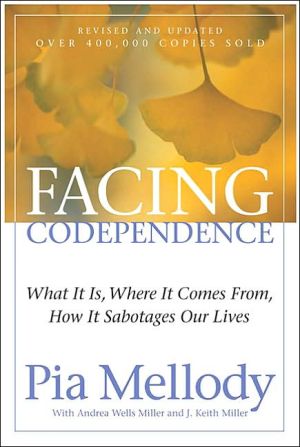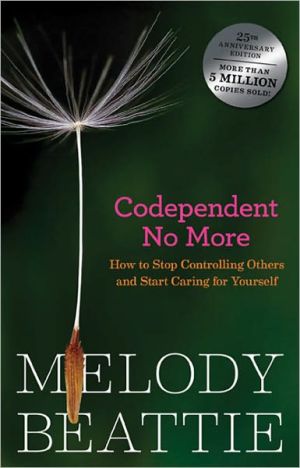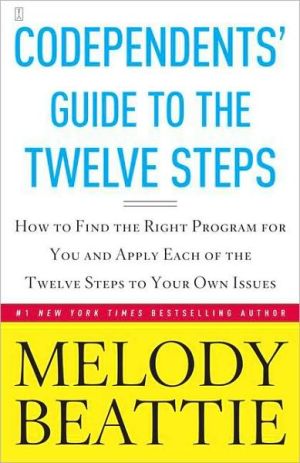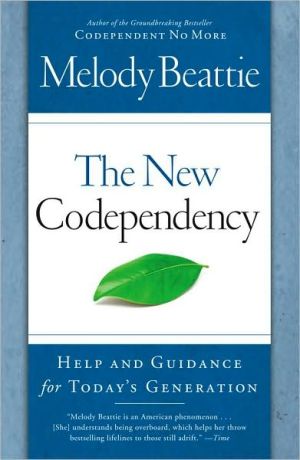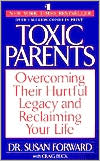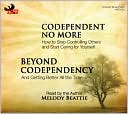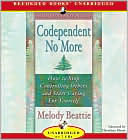Facing Codependence: What It Is, Where It Comes from, How It Sabotages Our Lives
Pia Mellody creates a framework for identifying codependent thinking, emotions and behaviour and provides an effective approach to recovery. Mellody sets forth five primary adult symptoms of this crippling condition, then traces their origin to emotional, spiritual, intellectual, physical and sexual abuses that occur in childhood. Central to Mellody's approach is the concept that the codependent adult's injured inner child needs healing. Recovery from codependence, therefore, involves...
Search in google:
Pia Mellody creates a framework for identifying codependent thinking, emotions and behaviour and provides an effective approach to recovery. Mellody sets forth five primary adult symptoms of this crippling condition, then traces their origin to emotional, spiritual, intellectual, physical and sexual abuses that occur in childhood. Central to Mellody's approach is the concept that the codependent adult's injured inner child needs healing. Recovery from codependence, therefore, involves clearing up the toxic emotions left over from these painful childhood experiences. Publishers Weekly This book stands out among the current glut of material on codependence because it claims the realm of parenting for its vantage point. The authors believe that codependents must heal themselves in order not to repeat the ``less than nurturing'' behaviors of their own addicted or emotionally dysfunctional parents. Hence, they couple strategies for recovery with guidelines on what is and is not ``normal'' in the parent-child relationship. The authors' conclusions will invite controversy; for instance, they suggest that ``emotional sexual abuse'' of children may lead to homosexuality in adulthood. Nor are they reluctant to generalize: ``Although physical and mental illness aren't addictions, their effect on the family is the same.'' Offsetting the opinionated commentary is great compassion for the helpless, hurt children who live inside adult codependents. Mellody and Andrea Wells Miller are coauthors of Breaking Free: A Recovery Workbook for Facing Co de pend ence ; J. Keith Miller is a freelance writer. Author tour. (July)
Facing Codependence\ What It Is, Where It Comes from, How It Sabotages Our Lives\ An increasing number of people have recognized themselves in the symptoms described in the following pages. They have begun to desire to change, to clear up the distortions, and to be healed from the painful aftermath of experiencing childhood in a dysfunctional family.\ If you are such a person, I want to offer you a great deal of hope. The first major step in changing and clearing up these distortions requires facing the fact that the disease exists in your life. One of the purposes of this book is to describe what the symptoms are, where they come from, and how they sabotage our lives, so that you can learn to recognize co dependence operating in your own life.\ This disease and its link to various forms of child abuse is a complex subject. Because of dysfunctional childhood experiences a co-dependent adult lacks the ability to be a mature person capable of living a full and meaningful life. Two key areas of a person′s life reflect codependence: the relationship with the self and relationships with others. The relationship with one′s self, I believe, is the most important, because when people have a respectful, affirming relationship with themselves, relationships with others automatically become less dysfunctional and more respectful and affirming. Much has been written about codependence in recent years, and many symptoms and characteristics have been described. My own work tells me that five symptoms form the core of the disease. Organizing the discussion of codependence around these five symptoms seems tomake it easier to grasp how the disease operates. Codependents have difficulty\ 1. Experiencing appropriate levels of self-esteem\ 2. Setting functional boundaries\ 3. Owning and expressing their own reality\ 4. Taking care of their adult needs and wants\ 5. Experiencing and expressing their reality moderately\ WHERE THE DISEASE COMES FROM\ I have come to believe that dysfunctional, less-than-nurturing, abusive family systems create children who become codependent adults. Our culture′s inherent belief that a certain kind of parenting is "normal" contributes to the difficulty of facing codependence. A closer examination of "normal" parenting techniques reveals that they include certain practices that actually tend to impair the growth and development of the child and lead to the development of codependence. In reality, what we tend to call normal parenting very often isn′t healthy for the child′s development; it is less-than-nurturing or abusive parenting.\ For example, many people think the range of normal parenting includes hitting a child with a belt, slapping a child across the face, screaming at a child, calling a child names, having the child sleep with them, or being nude in front of a child who is older than age three or four. Or they think it acceptable to require small children to figure out a way to deal with life is situations and problems themselves, rather than providing a concrete set of rules for social conduct and some basic problem-solving techniques. Some parents also neglect to teach basic hygiene such as bathing, daily grooming, the use of deodorants, dental care, removing dirt, stains, and body odour from clothes, and how to keep them mended, expecting the children to learn somehow on their own.\ Some parents think that if children are not given rigid rules and swift, severe punishment for breaking them, the children will become juvenile delinquents, teen unwed mothers, or drug addicts. Some parents, after making a mistake such as punishing a child in error because the full facts were not clear at the time of punishment, would never apologize to the child for the mistake. Such parents conceive that an apology would be seen as showing "weakness" that might undermine the parent′s authority.\ Some parents believe, perhaps unconsciously, that children′s thoughts and feelings have little validity because the children are immature and need training. These parents respond to a child′s thoughts and feelings by saying "You shouldn′t feel that way" or "I don′t care if you don′t want to go to bed -you′re going because it′s good for you!" and believe they are training the child in a functional way.\ Still other parents swing to the opposite extreme and over-protect their children, not making the children face the consequences of their own abusive and dysfunctional behaviour. Such parents are often very intimate with their children, using them for confidants and sharing secrets beyond the children′s level of development. This, too, is abusive.\ Many of us who were raised in homes where this kind of behaviour was common grew up in the delusion that what happened to us was "normal" and appropriate. Our caregivers encouraged us to believe that our problems arose because we didrft respond appropriately to what happened to us. And many of us arrived in adulthood filled with baffling feelings and with a distorted way of looking at what happened in our family of origin. We got the idea that the way our families behaved toward us was correct and our caregivers were good. This meant by unconscious deduction that since we weren′t happy or comfortable with some things that went on, we were not "good." Also, we apparently couldn′t please our parents by being what we were naturally. This delusion that the abuse was normal and we were "wrong" locks us into the disease of codependence with no way out.\ Facing Codependence\ What It Is, Where It Comes from, How It Sabotages Our Lives. Copyright (c) by Pia Mellody . Reprinted by permission of HarperCollins Publishers, Inc. All rights reserved. Available now wherever books are sold.
\ John Bradshaw"Mellody is a true pioneer...she offers tried and effective ways to treat codependency. This is a splendid offering."\ \ \ \ \ Publishers Weekly - Publisher's Weekly\ This book stands out among the current glut of material on codependence because it claims the realm of parenting for its vantage point. The authors believe that codependents must heal themselves in order not to repeat the ``less than nurturing'' behaviors of their own addicted or emotionally dysfunctional parents. Hence, they couple strategies for recovery with guidelines on what is and is not ``normal'' in the parent-child relationship. The authors' conclusions will invite controversy; for instance, they suggest that ``emotional sexual abuse'' of children may lead to homosexuality in adulthood. Nor are they reluctant to generalize: ``Although physical and mental illness aren't addictions, their effect on the family is the same.'' Offsetting the opinionated commentary is great compassion for the helpless, hurt children who live inside adult codependents. Mellody and Andrea Wells Miller are coauthors of Breaking Free: A Recovery Workbook for Facing Co de pend ence ; J. Keith Miller is a freelance writer. Author tour. (July)\ \
